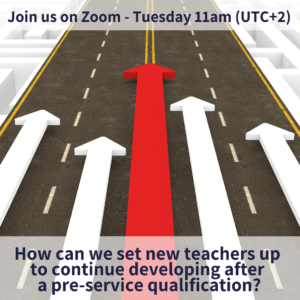The question morphed from “How can we help newer teachers continue their professional development?” to “How can we best help new teachers’” It was an extremely interesting and necessary conversation where we shared experiences and good practice.
Survival of the fittest?
For lots of new teachers the first few weeks and months are all about survival; survival in the class, of course, but also around all the non-teaching stuff too. It can be difficult for newer teachers to separate work and life resulting in long, long days and high levels of stress. We also need to remember it’s a new life, a new job, quite possibly a new country. Perhaps our key question should be, how much can they do without being overwhelmed?
There are some fabulous new teacher support programmes around where new teachers are paid a normal salary and have reduced hours, more development and mentoring.
Me and my coursebook
We also need to remember that new teachers spend an awful lot of time along with their coursebooks and often need help with time management and answering the tricky question of what exactly should my working time be? Be careful of making any assumptions. Clear guidance is really helpful.
Death by powerpoint
Teachers are planning more and more on their laptops and even in shared, busy staffrooms there is a less communicative, less sharing atmosphere. We also noted a trend towards an increased reliance on teaching through powerpoint. Powerpoint is a perfectly good tool, of course, but we need to use it in teaching with caution. Powerpoint can give the illusion of security but often ends up with very passive lessons and “death by powerpoint”. Perhaps powerpoint has become the new, evolved version of cutting up pieces of paper so highly prized on pre-service training of old. Pre-service providers should be wary of over-use and over-reliance on powerpoint. Instead of powerpoint we should encourage sensible use of the publishers digital offerings and also be aware of the distancing effect of over-use of screen sharing. We need to try to create active learning environments, as one Hubber shared their story of kicking the powerpoint habit and going cold turkey.
Creativity step by step
New teachers should work with a coursebook where possible and then add in creativity step-by-step. We agreed that a good teachers book is a thing of joy, “Straightforward” was mentioned as a good one!
Do you remember how it feels?
We talked about a version of the CEFR levels for teachers and raising awareness of where we are and how we can move forward. New teachers should start slowly and move into things gradually, it all needs practice. How many hours do we need to teach to become “expert”? Trainers, mentors and managers need to remember what it feels like to be a new teacher and act accordingly.
PPPP – planning prevents poor performance
We all felt that a strong plan is the best start that a new teacher can have and support should be given around this. One school mentioned gives plans for new teachers to follow and gently increases their independence as appropriate. We know that the first year of teaching can be a baptism of fire, some of us shared our own horror stories of mixed levels, no materials and dodgy timetables, it still feels so close for so many of us. Another idea was creating space for teachers to practice “tricky” bits of the class with a mentor. A further suggestion was around level meetings where teachers meet once a week to plan lessons together. Here teachers can learn to plan and to ask about anything they’re not sure about, including grammar and other language questions.
Clear expectations
Clarity around expectations is also so important to help new teachers know what is and what isn’t ok. Issues around discipline procedures, classroom volume, studiousness, etc. all need to be as clear as possible. Teachers need to understand what is “good noise” and what isn’t.
Interview hints
We also talked about avoiding problems with some new teachers at the interview stage. We should ask them about how they react to stress and should probably steer clear of perfectionists. Sadly, we know lots of new teachers are “on the edge”, they are uncomfortable and unfamiliar with the role(s) they need to play in different classes. Teachers need to find their own identities. Sometimes the teacher can be younger than the students and that can require confidence and presence. At the same time our teenage students should not become our friends even if we are closer in age to them than with other people. At the same time teachers need to find their staffroom identity, “how do I fit in here?” and then again, a new country, new language, potentially new everything… it can be both exciting and terrifying!
Is there a new “N-word”?
We went on to talk about the pros and cons of hiring new teachers already in situ, and it can make a huge difference. And the conversation naturally drifted onto the teachers’ first language. Is the N-word (native speaker) acceptable? Should we instead be talking about qualified, competent, proficient teachers? We know we can’t change the world but maybe we can change our worlds. Perhaps we should see the world in general as it really is, less binary; less right and wrong, left and right, black and white, native and non-native. The conversation rolls on.
